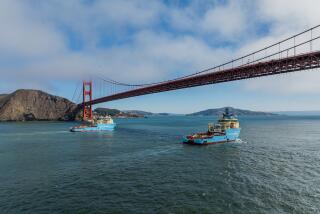Plan Has Outraged Ecologists : Lisbon to Scuttle Ship, 5,400-Car Cargo : Despite Outrage of Ecologists, Portugal to Sink Wrecked Ship and 5,400-Car Cargo
- Share via
LISBON — Portugal will send a new but wrecked ship and its cargo of 5,400 Japanese cars to the bottom of the Atlantic Ocean, despite the outrage of ecologists, because “no practical alternative is available.”
That was the comment of Adm. Silva Horta, chairman of the Portuguese National Council against Marine Pollution, after returning recently from London, where he reported on the case to the Convention on the Prevention of Marine Pollution by Dumping.
The 58,000-ton Reijin ran aground April 27 in shallow water off the northern city of Oporto, the first stop on its maiden voyage from Japan to Ireland. One sailor was killed.
Emerald Shipholding SA, a Japanese-owned Panamanian company to which the ship belongs, said July 13 that the Reijin was not recoverable and assumed responsibility for the wreck’s removal. The new cars must be scuttled because they could be unsafe to drive.
$100-Million Cargo
Horta said the company insisted on sinking the ship and its $100-million cargo at sea and threatened to abandon the wreck if Portugal refused to cooperate. That would leave the Portuguese with disposal project costing millions of dollars.
Environmentalists in Portugal and elsewhere say the 173 tons of copper and lead, 115 tons of paint, 28 tons of oil and more than 1,000 tons of rubber, plastic and textiles could seriously damage marine life.
Salvage workers are dismantling the Reijin’s top decks and ferrying the scrap metal and some cars ashore. The rest of the ship will be refloated, towed out and sunk in at least 6,000 feet of water, Horta said in an interview.
Cars now being unloaded will be dumped 40 miles off the coast, and the wreck, with the remaining cargo, will be scuttled 150 miles out by mid-November, the admiral said.
‘Ecological Crime’
The Robin Wood Assn., an ecology group based in Paris, has called the decision “an ecological crime” and further criticism has come from the Oslo Convention, which monitors sea pollution.
Portuguese environmentalists want action from the European Economic Community, of which Portugal has been a member since Jan. 1, 1986.
“It is indeed a crime, dangerous to the whole world, not just to Portugal,” Mike Weber, a German lecturer at Oporto’s Institute for Biomedical Science, said in a telephone interview. “Any ecology schoolbook will tell you that one liter of oil pollutes 1 million liters of water.”
Marine authorities believe they have no choice.
Possible Lawsuits
If the government tried to salvage the wreck, it not only would have to pay the estimated cost of $15 million but might also face claims from Japanese auto makers contending that their images were tarnished by the sale of potentially unsafe cars to bargain hunters.
“We could not take over the task of removing the ship ourselves because we did not have the technical, financial or even legal means to do so before the autumn bad weather,” Horta said.
Coast guard officials say the first storm of the winter season probably would destroy the grounded vessel and spread the wreckage in Portuguese coastal waters. So, the admiral said, “we consider the plan to dump at sea the lesser evil.”
Removal of another ship--the Tollan, grounded in the Tagus estuary off Lisbon in 1980--cost the government more than $1.4 million, and officials want to avoid a far larger bill for the Reijin.
‘Cannot Be Enforced’
Owners are required by Portuguese law to remove wrecks declared to be dangerous, but Horta said: “It is, unfortunately, well-known that this obligation very often cannot be enforced.”
Shipping companies that operate under the Panamanian flag of convenience often have little capital other than their vessels. Horta said the Reijin apparently was the only valuable asset of Emerald Shipholding.
More to Read
Sign up for Essential California
The most important California stories and recommendations in your inbox every morning.
You may occasionally receive promotional content from the Los Angeles Times.













